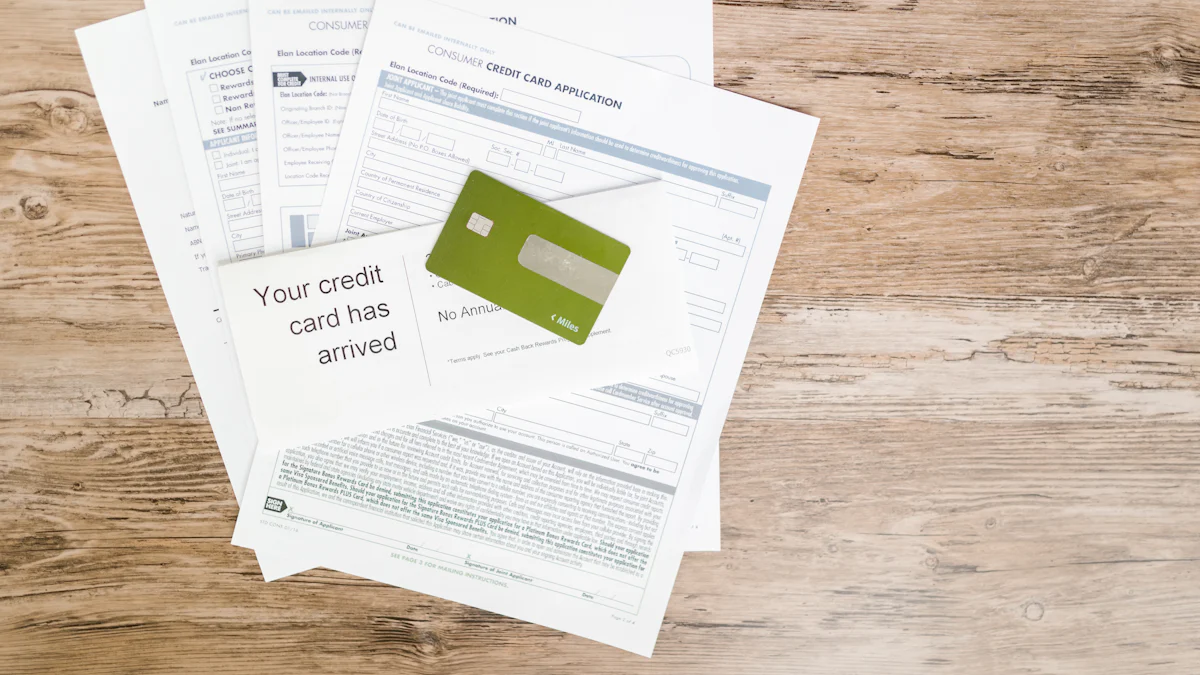Your Guide to Managing Credit Scores for Credit Card Approval
Image Source: pexels
Your credit score holds the key to unlocking financial opportunities. A strong score boosts your chances of credit card approval and opens doors to better rewards and lower interest rates. By learning how to improve credit score for credit card approval, you can take control of your financial future and achieve your goals.
Key Takeaways
-
Always pay your bills on time. This helps build good payment history and avoids late fees.
-
Use less than 30% of your credit limit. This shows you handle credit well and can raise your score.
- Check your credit report often for mistakes. Fixing errors can quickly improve your credit score.
Understanding Credit Scores and Their Role in Credit Card Approval

Image Source: pexels
What Is a Credit Score?
A credit score is a three-digit number that reflects your financial reliability. It shows lenders how likely you are to repay borrowed money. Credit scores typically range from 300 to 850, with higher scores indicating better creditworthiness. This number is calculated based on your financial habits, such as how often you pay bills on time and how much credit you use compared to your limit. Think of it as a snapshot of your financial health.
Why Credit Scores Matter for Credit Card Approval
Your credit score plays a crucial role in determining whether you qualify for a credit card. Lenders use it to assess the risk of lending to you. A higher score increases your chances of approval and may even unlock better perks, like lower interest rates or higher credit limits. On the other hand, a low score could lead to rejection or less favorable terms. Managing your credit score effectively is key to achieving your financial goals, including learning how to improve credit score for credit card approval.
Key Factors That Impact Your Credit Score
Several factors influence your credit score:
-
Payment history: Paying bills on time boosts your score.
-
Used credit vs. available credit: Keeping balances low helps maintain a healthy score.
-
Types of credit: A mix of credit accounts, like loans and credit cards, can improve your score.
-
Length of credit history: Older accounts show stability.
- New credit: Opening too many accounts at once can hurt your score.
Avoiding late payments and keeping balances manageable are essential steps to protect your credit score. Negative factors, like missed payments or high balances, can quickly lower your score and make credit card approval more challenging.
How to Improve Credit Score for Credit Card Approval
Pay Bills on Time Consistently
Paying your bills on time is one of the most effective ways to improve your credit score. Payment history makes up a significant portion of your score. Each timely payment builds a positive record, showing lenders that you are reliable. Late payments, on the other hand, can quickly damage your score. To stay on track, consider setting up automatic payments or reminders.
Tip : Consistently paying bills on time not only boosts your credit score but also helps you avoid late fees and penalties.
Keep Your Credit Utilization Ratio Low
Your credit utilization ratio is the percentage of your available credit that you are using. Keeping this ratio low, ideally in the single digits, can significantly improve your score. For example, if your credit limit is $10,000, aim to use less than $1,000. You can achieve this by paying off balances strategically or requesting a higher credit limit.
Note : A low credit utilization ratio signals to lenders that you manage credit responsibly.
Monitor Your Credit Report for Errors
Errors on your credit report can harm your score. Common mistakes include incorrect account statuses, duplicate debts, or even accounts opened due to identity theft. Regularly reviewing your report helps you spot and dispute these inaccuracies. Correcting errors can lead to a quick improvement in your score.
Action Step : Request a free credit report annually from major credit bureaus to ensure your information is accurate.
Resolve Negative Marks on Your Credit Report
Negative marks, such as late payments or collections, can weigh down your credit score. Address these issues by contacting creditors to negotiate payment plans or settlements. Once resolved, ask them to update your credit report. This proactive approach demonstrates responsibility and can help rebuild your score over time.
Diversify Your Credit Mix Strategically
A diverse credit mix shows lenders that you can handle different types of credit, such as credit cards, auto loans, or mortgages. Successfully managing a variety of accounts can positively impact your score. However, avoid opening unnecessary accounts just to diversify. Focus on maintaining a healthy balance of credit types you genuinely need.
Reminder : Keeping old accounts open, even after paying them off, can contribute to a strong credit mix.
Tips for Maintaining a Healthy Credit Score

Image Source: pexels
Avoid Excessive Hard Credit Inquiries
Every time you apply for a new credit card or loan, lenders perform a hard inquiry on your credit report. These inquiries can temporarily lower your credit score. To maintain a healthy score, limit the number of applications you submit within a short period. Instead, research and choose credit cards that align with your financial profile before applying. This approach minimizes unnecessary inquiries and protects your score.
Keep Old Credit Accounts Open
Closing old credit accounts might seem like a good idea, but it can actually harm your credit score. Older accounts contribute to the length of your credit history, which is a key factor in determining your score. Keeping these accounts open shows lenders that you have a stable credit history. If you no longer use an account, consider keeping it active by making small purchases and paying them off promptly.
Use Credit Cards Responsibly
Using credit cards wisely is essential for maintaining a strong credit score. Avoid maxing out your cards or carrying high balances. Instead, aim to use only a small portion of your available credit. This demonstrates responsible credit management and keeps your credit utilization ratio low, which positively impacts your score.
Set Up Automatic Payments or Alerts
Staying on top of your payments is crucial for maintaining a positive payment history. Setting up automatic payments ensures you never miss a due date. Alerts can also remind you of upcoming payments. Here’s how these tools help:
| Evidence | Explanation |
|---|---|
| Automatic payments ensure timely payments | This is crucial for maintaining a positive payment history, which is the most significant factor in credit scoring. |
| Avoidance of late fees | Late fees can increase credit card balances and negatively impact finances. |
| Consistent on-time payments improve credit scores | Payment history accounts for 35% of FICO® Scores and 40% of VantageScore® credit scores. |
Pay More Than the Minimum Balance
Paying more than the minimum balance on your credit cards offers multiple benefits. It reduces your credit utilization ratio, which accounts for about 30% of your credit score. Additionally, increasing your monthly payment can save you significant money in interest. For instance, by raising your payment from 3% to 6% of a $5,000 balance, you could cut your repayment period from over four years to under two years and save over $1,400 in interest. This habit not only improves your financial health but also strengthens your credit score over time.
Common Mistakes to Avoid When Managing Credit Scores
Closing Credit Accounts Without a Plan
Closing a credit account might seem like a good way to simplify your finances, but it can hurt your credit score. When you close an account, you reduce your total available credit. This change increases your credit utilization ratio, which can lower your score. Additionally, closing older accounts shortens your credit history, another key factor in credit scoring.
Tip : Before closing an account, consider the impact on your credit score. If you must close one, choose a newer account rather than an older one.
Applying for Multiple Credit Cards in a Short Time
Submitting several credit card applications in a short period can harm your credit score. Each application triggers a hard inquiry, which temporarily lowers your score. When you apply for multiple cards at once, the negative effects add up. Lenders may also view this behavior as a sign of financial instability.
-
Applying for too many accounts can lower your score.
- Multiple applications amplify the negative impact.
Instead of applying for several cards, research options carefully and choose one that fits your needs.
Ignoring Your Credit Report or Score
Neglecting your credit report can lead to missed errors or signs of identity theft. Mistakes like incorrect account statuses or unauthorized accounts can damage your score. Regularly checking your report helps you catch and fix these issues early.
Action Step : Review your credit report at least once a year. You can request a free report from major credit bureaus to stay informed.
Overspending Beyond Your Means
Spending more than you can afford not only strains your finances but also damages your credit score. High balances increase your credit utilization ratio, while missed payments lead to negative marks on your report.
-
Rising bills leave little room for savings.
- Overspending often results in financial stress.
Reminder : Create a budget and stick to it. Prioritize paying off balances to maintain financial stability and protect your credit score.
Managing your credit score is a journey that rewards consistency and smart choices. By applying these strategies, you can boost your score and unlock better financial opportunities.
Remember : Small, steady steps lead to big results. Start today, stay committed, and watch your financial future transform. You’ve got this! 💪
FAQ
How long does it take to improve your credit score?
Improving your credit score depends on your actions. Paying bills on time and reducing debt can show results in 3-6 months. Stay consistent for lasting improvement. ⏳
Can checking your credit score lower it?
No, checking your own credit score (soft inquiry) doesn’t affect it. It’s a smart habit to track your progress and spot errors. ✅
Tip : Use free tools like Credit Karma to monitor your score regularly.
What’s the best credit utilization ratio to aim for?
Aim for a credit utilization ratio below 30%. For the best results, keep it under 10%. This shows lenders you manage credit responsibly. 💳
Reminder : Pay off balances early to maintain a low ratio.
